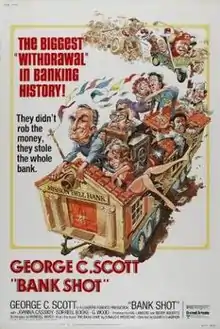Bank Shot
Bank Shot is a 1974 film directed by Gower Champion and written by Wendell Mayes. It was loosely based upon Donald E. Westlake's 1972 novel of the same name, which was the second book of his "Dortmunder" series. The film stars George C. Scott, Joanna Cassidy, Sorrell Booke, and G. Wood.
| Bank shot | |
|---|---|
 | |
| Directed by | Gower Champion |
| Produced by | Hal Landers Bobby Roberts |
| Screenplay by | Wendell Mayes |
| Based on | The Bank Shot by Donald E. Westlake |
| Starring | |
| Music by | John Morris |
| Cinematography | Harry Stradling, Jr. |
| Edited by | David Bretherton |
Production company | Landers-Roberts Productions |
| Distributed by | United Artists |
Release date | July 30, 1974[1] |
Running time | 83 minutes |
| Country | United States |
| Language | English |
Plot
A bank, temporarily housed in a mobile home while a new building is built, looks like an easy target to break into. On the other hand, why not steal the whole bank, and rob it in a safer location? That is what Al Karp, the former partner of jailed criminal planner Walter Ballantine, thinks, so Karp arranges for Ballantine to escape from the Streiger Institute (a privately run penitentiary) and convinces him to mastermind the heist. The film is narrated by Warden Streiger (known as "Bulldog" Streiger).
Cast
- George C. Scott as Walter Upjohn Ballantine
- Joanna Cassidy as Eleanora, also called "El"
- Sorrell Booke as Al G. Karp
- Don Calfa as Stosh Gornik
- Bibi Osterwald as Mums Gornik
- Frank McRae as Herman X
- Bob Balaban as Victor Karp
- G. Wood as FBI Supervisor Andrew Constable
- Clifton James as Warden Streiger
- Liam Dunn as Painter
- Hank Stohl as FBI Agent Johnson
- Jack Riley as FBI Agent Jackson
- Harvey J. Goldenberg as Policeman #1
- Jamie Reidy as Policeman #2
- Harvey Evans as Irving
- Pat Zurica as Man in Privy
Production
Wendell Mayes later said he wrote it because he loved Westlake's novels but felt the film failed due to the direction of Gower Champion. "I felt that Hollywood had never truly done justice to his [Westlake's peculiar brand of humor in motion pictures," said Mayes. "I was trying to do that brand of humor, something that is just slightly tilted, which at first you don't realize is slightly tilted. It was a charming idea... the idea of not simply robbing a bank but stealing the whole building. What happened is that Gower tried to turn it into a farce, and it didn't work. The people weren't equipped to play farce. Gower was a nice guy and a marvelous stage director; but the film simply wasn't deft, and it should have been. He held pretty much to the script but ruined what I thought was a good piece. He was the only bad experience I've ever had in my career with a director. I was bitterly disappointed." [2]
Reception
Vincent Canby of The New York Times was mildly amused: "It's not a great movie. It's not worth taking a taxi to see. Yet there are many less invigorating ways to waste one's time. ... The intensity of Scott's performance is highly comic. His Walter Ballantine has the discipline, self-assurance and narrow vision of the true fanatic. So, too, do most of the other characters in the film... Gower Champion, who has had more success as a Broadway director (Hello, Dolly) than as a maker of films (My Six Loves), seems to have had a great deal of fun with first-rate actors doing Bank Shot — grace of a work by someone who knows exactly what he's doing."[3] Arthur D. Murphy of Variety called it "an innocuous little trifle" and "formula caper material, hyped by humor that is variously silly, forced and strident."[4] Gene Siskel of the Chicago Tribune gave the film two stars out of four and dismissed it as "a trivial, television-caliber, bank heist comedy."[5] Charles Champlin of the Los Angeles Times wrote, "While 'The Bank Shot,' adapted by Wendell Mayes from a Donald Westlake novel, is at best a lightly amusing and never very suspenseful caper film, it is lit with moments of plain wonderful and imaginative silliness."[6] Gary Arnold of The Washington Post stated, "Despite its rather too effective air of inconsequence, 'The Bank Shot' is a reasonably good time," adding that "Champion demonstrates a wonderful talent for staging and shooting wide-screen sight gags."[7] Richard Combs of The Monthly Film Bulletin remarked that the film "definitely looks as if it belongs to a bygone age, to the days of Kramer's Mad, Mad World," with much of its sense of fun coming off as "decidedly strenuous and heavily mugged."[8]
See also
References
- "The Bank Shot - Details". AFI Catalog of Feature Films. American Film Institute. Retrieved July 20, 2019.
- McGilligan, Patrick (1997). Backstory 3: Interviews with Screenwriters of the 60s. University of California Press. p. 269.
- Canby, Vincent (August 1, 1974). "A Disarming 'Bank Shot': Crooks Prove Proper and Optimistic". The New York Times.
- Murphy, Arthur D. (July 10, 1974). "Film Reviews: Bank Shot". Variety. 16.
- Siskel, Gene (July 30, 1974). "Scott's 'Bank Shot's' no big shot". Chicago Tribune. Section 2, p. 4.
- Champlin, Charles (August 14, 1974). "Stylish Silliness in 'The Bank Shot'". Los Angeles Times. Part IV, p. 19.
- Arnold, Gary (July 20, 1974). "Slightly Off-Target 'Shot'". The Washington Post. F6.
- Combs, Richard (November 1974). "Bank Shot". The Monthly Film Bulletin. 41 (490): 246.